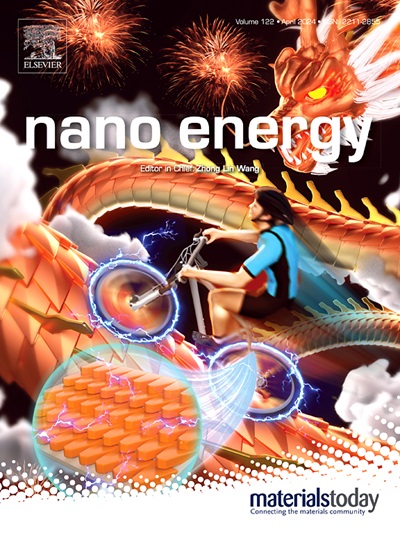Gadolinium-based Curie triboelectric nanogenerator for thermal gradient energy harvesting at gas-liquid interface
IF 16.8
1区 材料科学
Q1 CHEMISTRY, PHYSICAL
引用次数: 0
Abstract
The temperature difference between water and surrounding air in the environment often contains untapped energy. Here, we present the first gadolinium-based Curie triboelectric nanogenerator (GC-TENG) capable of harvesting thermal gradient energy at the gas-liquid interface. This device integrates a Curie engine with a solid-liquid-based triboelectric nanogenerator, enabling efficient two-step energy conversion from thermal gradient to mechanical to electrical energy. The optimized device incorporates ultra-lubricated ceramic bearings and high-performance magnets, achieving over 90 % transmission efficiency. It generates an open-circuit voltage of up to 220 V. Its charge density of 15 mC m⁻³ surpasses previous triboelectric nanogenerator-based thermal gradient energy harvesting technologies. The device's performance is enhanced through several innovations, including a high-efficiency power generator with exceptional bulk charge density characteristics and an optimized Curie engine with custom magnetic field design that boosts thermal conversion efficiency. The GC-TENG demonstrates excellent adaptability and stability, operating autonomously in real-world scenarios such as industrial wastewater discharge points. When combined with a GDT-Buck power management circuit, it effectively powers small electronic devices and enables intelligent monitoring systems. This study significantly expands the application of triboelectric nanogenerators, offering an innovative solution for distributed energy systems and environmental monitoring.

用于气液界面热梯度能量收集的钆基居里摩擦纳米发电机
环境中水和周围空气之间的温差通常包含未开发的能量。在这里,我们提出了第一个能够在气液界面收集热梯度能量的钆基居里摩擦纳米发电机(GC-TENG)。该装置集成了居里发动机和基于固体-液体的摩擦电纳米发电机,实现了从热梯度到机械能到电能的高效两步能量转换。优化后的装置结合了超润滑陶瓷轴承和高性能磁铁,传动效率超过90%。它能产生高达220v的开路电压。它的电荷密度为15毫微克(⁻³),超过了以前基于摩擦电纳米发电机的热梯度能量收集技术。该设备的性能通过几项创新得到增强,包括具有特殊体积电荷密度特性的高效发电机和具有定制磁场设计的优化居里发动机,可提高热转换效率。GC-TENG具有出色的适应性和稳定性,可在工业废水排放点等实际场景中自主运行。当与GDT-Buck电源管理电路相结合时,它有效地为小型电子设备供电,并实现智能监控系统。这项研究极大地扩展了摩擦纳米发电机的应用,为分布式能源系统和环境监测提供了一种创新的解决方案。
本文章由计算机程序翻译,如有差异,请以英文原文为准。
求助全文
约1分钟内获得全文
求助全文
来源期刊

Nano Energy
CHEMISTRY, PHYSICAL-NANOSCIENCE & NANOTECHNOLOGY
CiteScore
30.30
自引率
7.40%
发文量
1207
审稿时长
23 days
期刊介绍:
Nano Energy is a multidisciplinary, rapid-publication forum of original peer-reviewed contributions on the science and engineering of nanomaterials and nanodevices used in all forms of energy harvesting, conversion, storage, utilization and policy. Through its mixture of articles, reviews, communications, research news, and information on key developments, Nano Energy provides a comprehensive coverage of this exciting and dynamic field which joins nanoscience and nanotechnology with energy science. The journal is relevant to all those who are interested in nanomaterials solutions to the energy problem.
Nano Energy publishes original experimental and theoretical research on all aspects of energy-related research which utilizes nanomaterials and nanotechnology. Manuscripts of four types are considered: review articles which inform readers of the latest research and advances in energy science; rapid communications which feature exciting research breakthroughs in the field; full-length articles which report comprehensive research developments; and news and opinions which comment on topical issues or express views on the developments in related fields.
 求助内容:
求助内容: 应助结果提醒方式:
应助结果提醒方式:


